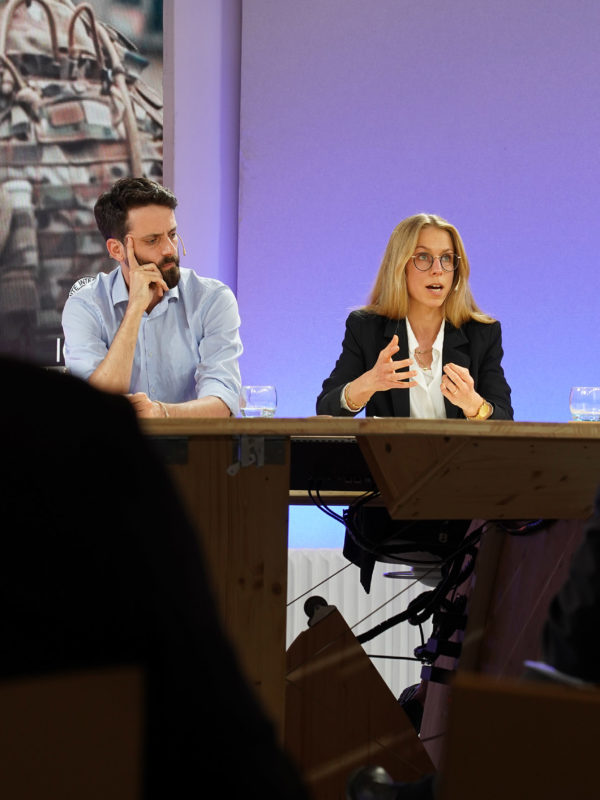At the Geneva Academy of International Humanitarian Law and Human Rights, research and policy engagement are closely intertwined. The Academy combines rigorous legal analysis with sustained engagement with practitioners, policymakers, and international institutions, with the aim of strengthening the understanding, interpretation, and implementation of international law in contexts of armed conflict, repression, and structural violence.
Across its work, the Geneva Academy addresses a number of cross-cutting issues, including the rights of children, the rights of persons belonging to minorities, gender, and the impact of emerging technologies on international law. These perspectives inform both research priorities and policy engagement activities.
The Academy develops two complementary strands of work. It carries out academic-oriented research, producing in-depth legal analysis that contributes to scholarly debate and clarifies contested areas of international law. It also develops policy-oriented projects, which translate legal analysis into dialogue, coordination, and engagement formats that support decision-making, accountability efforts, and institutional practice.
Policy engagement is structured in particular through the Geneva Human Rights Platform (GHRP), the Academy’s flagship initiative for policy-oriented projects in the field of human rights protection and governance. Rooted in human rights, the Platform provides trusted spaces for dialogue and cooperation among States, UN mechanisms, civil society actors, and academic experts. While not covering all thematic areas symmetrically, it engages with issues that intersect with several of the Geneva Academy’s priority areas, notably where questions of protection, accountability, prevention, and institutional coherence arise.
Alongside research and policy-oriented projects, the Academy undertakes a wide range of engagement and dissemination activities, including expert workshops, seminars, conferences, policy dialogues, and public-facing outputs such as working papers, policy briefs, blog posts, podcasts, and digital platforms.
The Academy’s research and policy engagement work is organised around five priority areas.
Armed Conflict, Civilian Harm, and the Law of War
This priority area focuses on the legal analysis of armed conflicts and the application of international humanitarian law. It covers the identification and classification of armed conflicts, the determination of applicable legal frameworks, and the interpretation of core IHL rules governing the conduct of hostilities and the protection of persons affected by armed conflict.
The Academy’s work in this area combines academic-oriented research with expert engagement and public events addressing the evolution of armed conflicts and the challenges posed by contemporary forms of warfare. Through research projects, workshops, and seminars, it examines how legal classification shapes humanitarian action, accountability processes, and policy responses, and how international humanitarian law is interpreted and applied in practice.
Human Rights Protection and Governance
This priority area addresses the protection of individuals and groups under international human rights law and the functioning of international human rights governance. It brings together academic research and policy-oriented projects on human rights protection, institutional coherence, and the operation of international and regional human rights mechanisms.
A central component of this area is policy engagement through dialogue, coordination, and quiet diplomacy, including exchanges among States, UN mechanisms, civil society actors, and experts. Activities include public and confidential meetings, coordination initiatives, and thematic events addressing contemporary challenges affecting the effectiveness, inclusivity, and universality of the international human rights system.
Accountability, Justice, and Prevention
This priority area examines responsibility for serious violations of international humanitarian law and international human rights law, as well as efforts aimed at preventing such violations. It covers individual and collective responsibility, international criminal law, and the role of international, hybrid, domestic justice mechanisms and transitional justice.
The Academy’s work in this area spans academic research, policy-oriented projects, and high-level engagement. It includes legal analysis of accountability frameworks, expert meetings and conferences on international and transitional justice, and policy dialogues on prevention, early action, and compliance with international law. Particular attention is given to the links between accountability, prevention of atrocity crimes, and institutional responses at international and national levels.
Weapons and Arms Transfers
This priority area focuses on the regulation of weapons and arms transfers under international law. It addresses legal frameworks governing the trade, transfer, and use of weapons, including arms export controls, due diligence obligations, and the responsibilities of States and other actors involved in arms-related activities.
Through research, policy-oriented projects, and expert events, the Academy examines how weapons regulation intersects with international humanitarian law, human rights law, and accountability considerations. Activities in this area support informed debate among policymakers, practitioners, and civil society, and contribute to a better understanding of legal obligations and standards applicable to arms transfers.
New Technologies and Human Rights
This priority area explores the human rights implications of new and emerging technologies, particularly in contexts related to security, warfare, and law enforcement. It addresses legal and policy questions raised by technologies such as digital surveillance tools, artificial intelligence, and neurotechnology, and their impact on fundamental rights and freedoms.
Work in this area is primarily developed through policy-oriented projects, expert meetings, and public events that bring together legal scholars, policymakers, and practitioners. The focus is on understanding how existing legal frameworks apply to technological change and how international law can respond to emerging risks while safeguarding human rights.
IHL in Focus
IHL in Focus is the Academy’s flagship research project on the classification of armed conflicts and the assessment of civilian harm.
Through systematic legal analysis and the use of reliable secondary data, the project examines how international humanitarian law (IHL) is applied in practice and how it can better protect civilians.
Its online platform, the War Watch portal, provides regularly updated conflict classifications, spot reports, and global monitoring of civilian harm.
The initiative is complemented by the War Watch podcast, which brings expert discussion and field-informed analysis to a wider audience, exploring how the rules of war operate in real time.
War WATCH
War WATCH is a flagship digital platform of the Geneva Academy that brings together legal conflict classification and rigorous documentation of civilian harm in one accessible, interactive space.
By merging the legacy of RULAC with the analytical framework of IHL in Focus, it offers an authoritative, visually driven tool to understand how armed conflicts unfold and how civilians are affected.
Designed for practitioners, journalists, researchers and policy-makers, War Watch transforms complex legal analysis into clear, navigable insights on contemporary and historical conflicts worldwide.
Geneva IHL Lab
The Geneva IHL Lab is a hands-on, practice-oriented course offered by the Geneva Academy that trains Master’s students in open-source research and legal analysis under international humanitarian law.
It brings together students from the Academy, the Graduate Institute, and the University of Geneva, organised into teams each focused on a current armed conflict.
By working with publicly available information in conflict settings, participants build practical skills in gathering, evaluating, and interpreting evidence to assess compliance with IHL.
Geneva Human Rights Platform
The Geneva Human Rights Platform is a policy engagement initiative dedicated to supporting dialogue, coordination, and cooperation in the field of human rights protection and governance.
It provides trusted spaces for exchange among States, UN mechanisms, civil society actors, and experts, contributing to informed and inclusive policy processes within the international human rights system.

